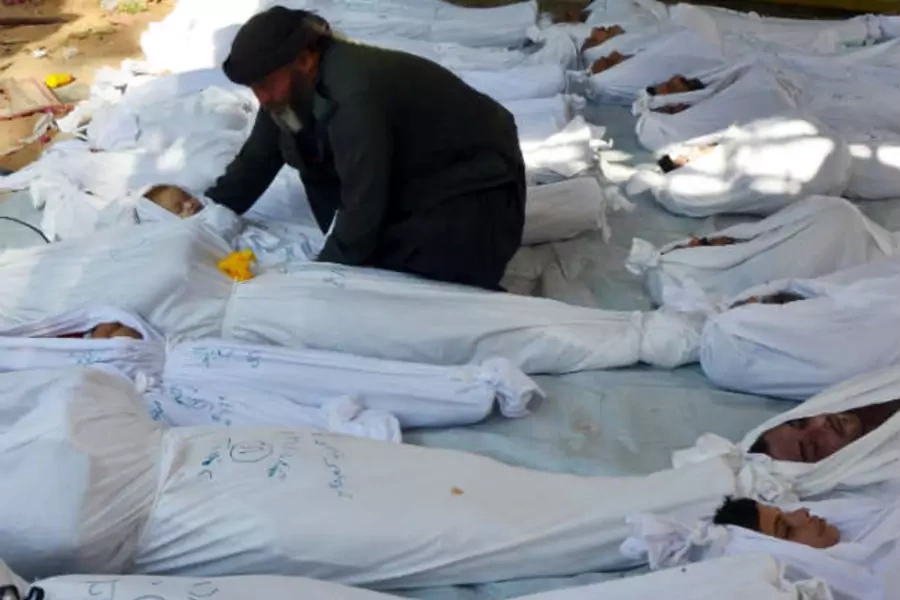Middle East Matters This Week: Alleged Syrian Chemical Weapons Use, Mubarak Leaves Prison in Egypt

More on:
Significant Developments
Syria. French foreign minister Laurent Fabius called today for a forceful international response to reports that the Syrian regime used chemical weapons outside Damascus yesterday. However, Fabius added that “there is no question of sending troops on the ground.” The UN Security Council held an emergency session yesterday and issued a statement calling for a prompt investigation into the alleged use of chemical weapons; however the UN team of chemical weapons inspectors that is currently in Damascus does not have permission from the Syrian government to investigate the site of yesterday’s attack. Syria’s opposition claims the government is responsible for the chemical weapons attack, but the Assad regime denies any involvement. Hundreds, and possibly thousands, of men, women, and children were killed in Wednesday’s attack.
Meanwhile, clashes between Kurdish militias and al Qaeda-linked rebel groups in the northern provinces of Syria have escalated in the past week in what threatens to become a new war. Elsewhere, regime troops retook large swathes of President Bashar al-Assad’s home province of Latakia on Monday.
Egypt. Former Egyptian president Hosni Mubarak was released from prison today and transported by helicopter to Maadi Military hospital. The move followed an appeals court ruling yesterday that Mubarak had been held the maximum number of days pre-verdict. Interim prime minister Hazem al-Beblawi ordered Mubarak to be held under house arrest following his release. Mubarak still faces charges of corruption and the deaths of protesters during the 2011 revolution. Mahmoud Ezzat was named interim leader of the Muslim Brotherhood on Tuesday, after Egyptian security forces arrested Mohamed Badie, the supreme guide of the Muslim Brotherhood, earlier in the day.
Tunisia. The ruling Nahda party agreed in principle today to a plan proposed by the UGTT trade union federation for the transition to new elections. The plan calls for the current government to step down and for a neutral interim cabinet to steer the country to new elections. The Nahda party previously rejected calls for a nonpartisan government, but now appears willing to shift its position. Tunisia has been experiencing a fresh wave of protests following the assassination of Mohamed Brahmi, the second opposition figure to be killed in the past six months.
U.S. Foreign Policy
Egypt. President Barack Obama met with his national security team on Tuesday to discuss responses to the Egyptian military’s crackdown. White House spokesman Josh Earnest denied on Tuesday that U.S. aid to Egypt had been cutoff or suspended as had been suggested by Senator Patrick Leahy’s office earlier in the day. “A decision to cut off aid would be announced, if it were to be announced, after that review had been completed,” Earnest told reporters, referring to the still ongoing review of aid that Obama ordered in July.
Syria. General Martin Dempsey, the chairman of the joint chiefs of staff, wrote in a letter to Representative Eliot Engel on Monday that, “Syria today is not about choosing between two sides but rather about choosing one among many sides.” He acknowledged the United States could take out the Syrian air force, but that such action might “further commit the United States to the conflict.” Dempsey was responding to a letter from Engel that inquired about the potential for punishing President Bashar al-Assad’s government. Dempsey’s response pre-dates reports that the Syrian regime used chemical weapons on Wednesday.
Lebanon. Maura Connelly, U.S. ambassador to Lebanon, left the country on Tuesday, completing three years as the top U.S. official in the country. David Hale, former U.S. special envoy for Middle East peace, is expected to take over the post in the next few weeks.
While We Were Looking Elsewhere
Iran. Ali Asghar Soltanieh, Iran’s longtime ambassador to the International Nuclear Energy Agency, told Reuters yesterday that he will leave his post on September 1. Soltanieh will be the third senior nuclear official replaced since President Hassan Rouhani assumed office on August 3. A spokesman for the Iranian foreign ministry told reporters on Tuesday that newly confirmed Foreign Minister Mohammad Javad Zarif may handle nuclear negotiations.
Iraq. Over thirty thousand refugees have streamed into Iraq from Syria over the past week. Aid agencies reported on Tuesday that the Kurdistan regional government has put in place a quota limiting the number of refugees to three thousand per day. Meanwhile three separate car bombings in southern cities on Tuesday killed at least ten people.
Lebanon. Hezbollah member of parliament Ali Miqdad defended his group’s stepped-up security measures in Beirut today in response to a car bombing that killed twenty-seven people last week. Members of the Future parliamentary bloc criticized Hezbollah’s checkpoints in the capital’s southern suburbs on Tuesday for being “militia-like.” Last week’s car bombing was the deadliest in Lebanon in decades.
This Week in History
This week marks the twentieth anniversary of the initialing of the "Declaration of Principles on Interim Self-Government Arrangements," also known as the Oslo Accords. On August 20, 1993, Israeli officials Uri Savir and Joel Singer joined senior Palestinian Liberation Organization officials Ahmed Qurei (Abu Alaa) and Hassan Asfour to initial the Declaration of Principles. Also attending was Israeli foreign minister Shimon Peres. The agreement to negotiate further interim measures had been secretly negotiated between Israeli and Palestinian negotiators in Norway. Soon after the initialing of the agreement, Israeli prime minister Yitzhak Rabin and PLO chairman Yasser Arafat traveled to Washington where they signed the agreements on the White House lawn on September 13, 1993.
More on:
 Online Store
Online Store